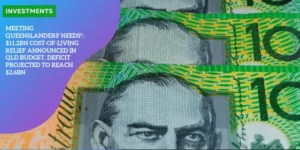Brighter Economic Outlook: Potential for Early Inflation Relief and a Stimulated Economy

Australian households and businesses are poised for a potential economic reprieve as the upcoming federal budget forecasts a swifter decline in inflation than previously anticipated.
This news, if accurate, could have a significant ripple effect, boosting household budgets, bolstering business investment, and propelling the overall economic landscape forward.
Treasury’s Optimistic Forecast: A Beacon of Hope
The budget documents scheduled for release tomorrow paint a more optimistic picture compared to recent economic anxieties.
The consumer price index (CPI), a key indicator of inflation, is projected to plummet back within the target range of 2-3% by December 2024.
This represents a substantial drop from the current rate of 3.6%, offering a potential turning point after a period of rising prices that strained household finances and eroded purchasing power.
A Departure from RBA’s Predictions: A Tale of Two Forecasts
This positive outlook stands in stark contrast to the Reserve Bank of Australia’s (RBA) current forecast. The RBA anticipates inflation to climb to 3.8% in December before gradually tapering off, with the target range achievement pushed back to late 2025.
Government Action: A Calculated Approach to Inflation
The discrepancy between the Treasury and RBA forecasts can be attributed, in part, to the government’s upcoming budget measures. These measures, to be unveiled tomorrow, are factored into the Treasury’s calculations but are not yet available to the RBA. This distinction highlights the distinct roles of each entity: the Treasury forecasts based on a comprehensive view of government policy, while the RBA maintains its independence in monetary policy decisions.
Early Interest Rate Cuts: A Potential Boost for the Economy
Should the Treasury’s forecast materialize, it could pave the way for earlier-than-expected interest rate cuts. Banks currently anticipate the first rate cut to occur in late 2024 or early 2025, based on previous inflation figures. However, a faster decline in inflation could prompt adjustments to these predictions. Lower interest rates can stimulate borrowing and investment, potentially accelerating economic growth. This, in turn, could lead to increased job creation and a rise in overall economic activity.
Combating Inflation: A Multi-Faceted Approach
While the specific details of the budget’s inflation-combating measures remain under wraps until tomorrow, Minister Gallagher confirmed the government’s recognition of the ongoing challenge of inflation. The budget will likely include a multi-pronged approach designed to alleviate pressure on household budgets. Examples could include tax breaks, targeted subsidies for essential goods and services, or investments in infrastructure projects that aim to improve supply chain efficiency and reduce transportation costs.
RBA’s Cautious Optimism: Collaboration is Key
RBA Governor Michele Bullock expressed cautious optimism about the budget’s potential impact on inflation. She acknowledged the government’s intention to avoid fueling inflationary pressures but emphasized the need to analyze the budget’s specifics before revising forecasts. However, she did concede that early indications suggest the government prioritizes inflation control. This collaborative approach between the government and the RBA is crucial for navigating the current economic climate.
Looking Ahead: Navigating the Economic Landscape
The prospect of a faster decline in inflation presents a welcome development for Australian consumers and businesses alike. Lower inflation should translate to increased purchasing power, potentially stimulating economic growth. Additionally, the possibility of earlier interest rate cuts could provide relief for borrowers and boost economic activity. However, it’s crucial to monitor the actual inflation trajectory in the coming months. The effectiveness of the government’s proposed measures will need to be evaluated, and adjustments made if necessary. The RBA will undoubtedly play a vital role in this process, using updated data to refine their monetary policy decisions.
Beyond the Budget: Maintaining Vigilance and Making Informed Decisions
The upcoming budget and its potential impact on inflation represent a significant event with far-reaching consequences for the Australian economy. As the situation unfolds, staying informed about the latest developments and their implications will be essential for both individuals and businesses. By closely monitoring the effectiveness of government policies and the RBA’s monetary stance, Australians can make informed financial decisions and navigate the evolving economic landscape.
Additionally, consumers can take proactive steps to manage their finances in an inflationary environment. This could include creating a budget, prioritizing essential spending, and exploring cost-saving strategies for groceries, utilities, and other expenses. Businesses, on the other hand, may consider reviewing pricing strategies, optimizing supply chains, and exploring ways to improve operational efficiency to mitigate the impact of rising costs.
By working together, the government, the RBA, consumers, and businesses can navigate the current economic climate and pave the way for a more stable and prosperous future.






